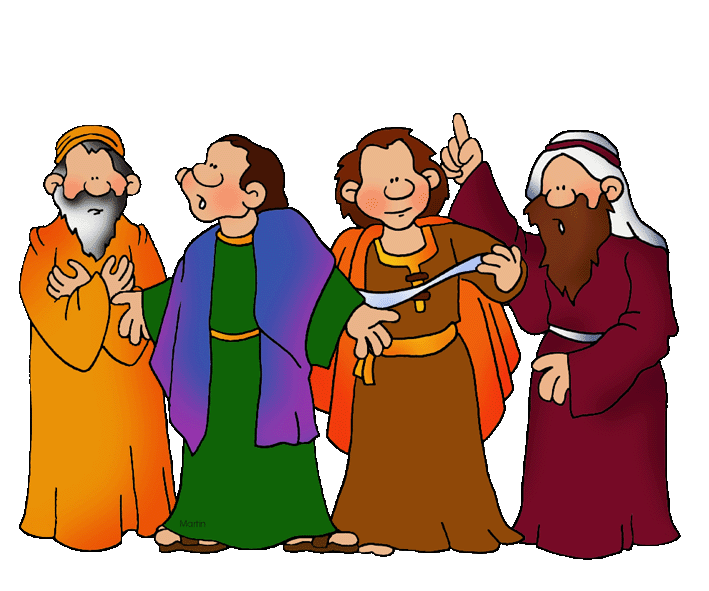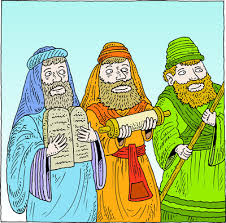John 12:12 - The next day the large crowd that had come to the feast heard that Jesus was coming to Jerusalem.
At the close of John chapter 11, we found many of the Jews wondering if Jesus was going to come to Jerusalem for the Passover or not. On the one hand, it was a requirement of all Jewish males. On the other hand, the religious leaders had put a BOLO (be on the lookout) alert for Jesus. If anyone saw him, they were to report it immediately so that he could be arrested. Those who failed to comply would be punished.
 So there was a general buzz or excitement on the minds of all the Jews. Eventually, word spread that Jesus was definitely coming to Jerusalem.
So there was a general buzz or excitement on the minds of all the Jews. Eventually, word spread that Jesus was definitely coming to Jerusalem. These events are recorded in all of the gospels (Matthew 21, Mark 11 and Luke 19). The other gospel writers give specific details which John does not mention, so you might want to review all of the accounts to get a fuller picture of what actually occurred.
As he came into the city, Jesus was acknowledged by a great crowd of people. Specifically, these were common people who 'had come to the feast', indicating they were country people who traveled from the more remote parts of the known world for the Passover. Many of them heard Jesus teach/preach (and saw him work miracles) as he traveled throughout the towns and villages of the region. These unbiased listeners were glad to see him again. They were delighted to demonstrate their respect for him in Jerusalem.
This is the exact opposite of the religious rulers and Jerusalem Jews. For the most part, they despised and rejected Christ.
This is not surprising; scripture tells us that God has chosen the weak and foolish things of this world to confound those who think they are wise:
1 Corinthians 1:26-27 - For you see your calling, brethren, how that not many wise men after the flesh, not many mighty, not many noble, are called: But God has chosen the foolish things of the world to confound the wise; and God has chosen the weak things of the world to confound the things which are mighty;
God values the hearts/souls of men, not the titles or honors which society bestows upon them.
John 12:13 – So they took branches of palm trees and went out to meet him, crying out, "Hosanna! Blessed is he who comes in the name of the Lord, even the king of Israel!"
We can't help but notice that the crowd didn't just casually wait for Jesus to appear at the temple – they went out of their way to seek him out. Why do you suppose they went to meet him with palm branches?
 Historically, palm branches/leaves were used in marches or processions as emblems of rejoicing and victory. They were also used in ceremonies where kingly power was bestowed upon a person or on occasions where people rejoiced while receiving a new king.
Historically, palm branches/leaves were used in marches or processions as emblems of rejoicing and victory. They were also used in ceremonies where kingly power was bestowed upon a person or on occasions where people rejoiced while receiving a new king.
The crowd also shouted as they welcomed Jesus into the city. They are actually quoting from Psalms 118, which is a Messianic psalm.
Psalm 118:24-26 - This is the day which the LORD has made; we will rejoice and be glad in it. Save now, I beseech you, O LORD: O LORD, I beseech you, send now prosperity. Blessed be he that comes in the name of the LORD: we have blessed you out of the house of the LORD.
This particular psalm was designed to produce a continual longing for the Messiah in the hearts of the Jewish people. It speaks of a desire for the kingdom of Christ to flourish and prosper. The Jews frequently used it as a prayer. That being the case, they knew it by heart.
We should not be surprised that Holy Spirit put this psalm into the hearts and minds of his people on that day. By shouting this out, the crowd acknowledges Jesus to be the Messiah, the long awaited source of redemption and salvation. In fact, the word 'hosanna' is a Hebrew word meaning 'save, now, we pray'. It is an exclamation of praise to the Lord as well as an invocation of blessings.
Now we understand what was happening in Jerusalem all those years ago. The common Jews acted as heralds or messengers proclaiming the coming of the Messiah, Jesus Christ, and asking that God would bless and prosper his kingdom.
What does this mean for our generation?
Do we long to see the kingdom of God flourish and prosper here on earth? To 'long' means to earnestly and intently desire. It means you can't think about anything else. It means that you talk about it, all the time. It means you would give up anything or do anything in order to achieve your desire. So let me ask you again: do you long for the kingdom of heaven to prosper here on earth?
If so, your prayer life should reflect it:
Matthew 6:10 - Your kingdom come. Your will be done in earth, as it is in heaven.
Often times our prayers are very self centered and immature. We pray only for our own comfort and prosperity. But what about praying for God to manifest his kingdom here on earth? What about praying for people to be healed, delivered and saved? When those things happen, the kingdom of God is definitely being manifested on earth.
I recently received a newsletter from the ministry founded by Brother Andrew, who smuggled bibles into foreign countries at the cost of life and limb. He lived an extraordinary life trusting in God for miracles so that the kingdom of God might be spread throughout the world. Here is a quote of his, as noted in the newsletter:
"If we understood the potential power of our prayers, we would be on our knees a hundred times a day asking Him for things that would turn the world upside down".
Brother Andrew prayed for the kingdom of God to be manifested here on earth. What about us? What are we praying and believing for?
John 12:14-15 – And Jesus found a young donkey and sat on it, just as it is written, "Fear not, daughter of Zion; behold, your king is coming, sitting on a donkey's colt!"
This was a fulfillment of prophesy given hundreds of years before by the prophet Zechariah:
Zechariah 9:9 - Rejoice greatly, O daughter of Zion; shout, O daughter of Jerusalem: behold, your King comes unto you: he is just, and having salvation; lowly, and riding upon a donkey, and upon a colt the foal of a donkey.
All Jews, including the religious leaders, agreed that this prophesy spoke of the coming Messiah.
Zechariah prophesied to the Jews, particularly those in Jerusalem, that their spiritual King would shortly come to them, bringing salvation. His kingdom was not physical, but spiritual. This King would be very easy to recognize – he would come in a spirit of meekness, without pomp or accolades, sitting upon a donkey.
 His coming would be to their profit/advantage. Once he arrived, there would be no more reason to fear; the yoke of bondage caused by sin would be broken and they would be truly free (John 8:36). This news should give them reason for great rejoicing (hence the palm branches).
His coming would be to their profit/advantage. Once he arrived, there would be no more reason to fear; the yoke of bondage caused by sin would be broken and they would be truly free (John 8:36). This news should give them reason for great rejoicing (hence the palm branches).Let's talk about the donkey for a minute. In ancient times, donkeys were ridden by men of great honor or authority (Judges 10:4, 12:14). But during the reign of Solomon, horses were imported into Israel in great numbers. After that, everyone rode horses except the poorest people. However, donkeys were still used as beasts of burden, carrying heavy loads whenever needed.
Any natural/earthly king who was being presented to his subjects during this time period would never have ridden a donkey. Therefore, Jesus riding on the donkey was not just a coincidence or an accident. He did it on purpose; it was an obvious fulfillment of prophesy. It was also appropriate - he would soon be bearing the full burden of sin for the human race.
This should have been clear to the religious leaders, who were already very familiar with Old Testament prophesy, but they did not see it due to their self-induced spiritual blindness.
What about the people of God (the church) in this generation? We too are told to rejoice and fear not, for our King has already defeated the enemy (Colossians 2:13-15) and broken the chains of sin and darkness. We are encouraged to enforce the reign of Christ upon the earth, sharing peace and salvation with those who are still lost.
We too have the assurance that our King is coming yet again! The first time he came as a lamb, meek and lowly bringing salvation, but the next time he will come as the Lion of the tribe of Judah! He will come as a mighty warrior defeating his enemies and bringing all things under subjection to himself. He will reign upon this earth for a thousand years and every knee will bow to him. This is great reason to rejoice!
John 12:16 – His disciples did not understand these things at first, but when Jesus was glorified, then they remembered that these things had been written about him and had been done to him.
The Jews who were present on that day waving palm branches and shouting 'hosanna' were doing so because they were prompted by Holy Spirit. The probably did not fully understand that prophesy was being fulfilled through them.
Neither did the twelve understand what they were witnessing. They heard the shouts of the multitude proclaiming Jesus as the Messiah, and they saw him riding on the donkey, but at the time they did not perceive the significance of these events.
But later, after Jesus ascended to heaven and Holy Spirit came into the world, these things were made clear.
John 14:26 - But the Comforter, who is the Holy Spirit, whom the Father will send in my name, he shall teach you all things, and bring all things to your remembrance, whatsoever I have said unto you.
Notice that two things were necessary for their understanding:
- They needed to know what Jesus said.
- They needed Holy Spirit to illuminate their minds.
We need those same two things. We need to read the Bible, even if we don't fully understand everything we are reading. Don't make the mistake that some Christians do by ignoring certain portions of scripture because they don't fully understand it (Isaiah? The minor prophets?), or they think it's boring (Leviticus?). Paul tells us that ALL scripture is profitable to us (II Timothy 3:15).
And, as we just pointed out, Holy Spirit is willing and able to bring you to a full understanding of the scripture, if you will pray and seek for the answer.
John 12:17-18 – The crowd that had been with him when he called Lazarus out of the tomb and raised him from the dead continued to bear witness. The reason why the crowd went to meet him was that they heard he had done this sign.
Meanwhile, as these events unfolded, Holy Spirit began to move upon the Jews who had witnessed the resurrection of Lazarus. These were the Jews of Jerusalem. Many of them were prominent, well respected citizens and/or men of distinction. They had spent weeks bearing witness of the power of Christ to anyone who would listen.
Now that Jesus was in town, they began to point him out, reminding people of his resurrection power. As eyewitnesses, they were reliable sources of information. Through them, any out-of-town Jews who had not heard of Jesus were being informed of his ministry. Thus, God turned the minds of all Jerusalem toward Jesus just before his crucifixion.
John 12:19 – So the Pharisees said to one another, "You see that you are gaining nothing. Look, the world has gone after him."
It wasn't long before the Pharisees either saw or heard about Christ's public entry into Jerusalem. When Jesus left the public eye several weeks earlier and retreated into the wilderness with his disciples, the Pharisees erroneously thought they had silenced their enemy. They vainly hoped they had seen and heard the last of this rogue teacher.
 But they were sorely mistaken. More and more and more Jews were turning to Jesus. It seemed like every Jew in Jerusalem was following after him. The Pharisees describe it as 'the world' turning to follow Christ.
But they were sorely mistaken. More and more and more Jews were turning to Jesus. It seemed like every Jew in Jerusalem was following after him. The Pharisees describe it as 'the world' turning to follow Christ. Of course, the phrase 'the world' is used not used in a literal sense. It is a hyperbole used to denote a large number of people. In the same way, we might say 'everyone' was at the football game when in reality everyone in town was not present. The meaning is that there were a large number of people in attendance.
This show of support for Jesus enraged the religious leaders. You can sense the bitterness in their words as they watched their enemy be acknowledged as the Messiah.
Psalm 112:9-10 - He [the Messiah] has dispersed, he has given to the poor; his righteousness endures forever; his strength shall be exalted with honor. The wicked shall see it, and be grieved; he shall gnash with his teeth, and melt away: the desire of the wicked shall perish.
Despite all of their plans, decrees and threats, more and more people were turning to Christ. The religious leaders were utterly powerless to stop the spread of the gospel message.
Their anger and vexation caused them to 'dig in their heels' and renew their commitment to bring about the death of Jesus sooner rather than later.
John 12:20 – Now among those who went up to worship at the feast were some Greeks.
Who are the Greeks that John mentions in this verse? There are several theories:
- They may have been Jews who lived in Greek or Hellenistic cities and therefore spoke Greek. At this time, there were large groups of Jews scattered in several places throughout the known world including Asia Minor, Greece, Macedonia and Egypt just to name a few.
- They may have been proselytes to the Jewish religion. In other words, they were Gentiles who wanted to convert to Judaism, so they become circumcised and followed the Law.
- They may have simply been Gentiles, who heard of the miracles of Jesus and came to Jerusalem to offer sacrifices to God and worship him according to the manner of the people of the land.
Although each theory has its own devoted followers, for the purposes of this lesson we are going to assume the Greeks were Gentiles.� Here is why:
- It was very common for the Jews to use the term 'Greek' in place of 'Gentile':
Acts 19:10 - And this continued by the space of two years; so that all they who dwelt in Asia heard the word of the Lord Jesus, both Jews and Greeks.
Other examples are Acts 14:1, Acts 16:1, Romans 1:16, Galatians 3:28, etc.
2. There is no reason to assume that John meant anything other than Gentile when he used the common term 'Greek'.
3. It is clearly evident in scripture that many Greeks/Gentiles came to Jerusalem to worship God. One example is the Ethiopian eunuch who had an encounter with Philip:
Acts 8:27 - And he arose and went: and, behold, a man of Ethiopia, a eunuch of great authority under Candace queen of the Ethiopians, who had the charge of all her treasure, and had come to Jerusalem to worship,
Other examples include Cornelius (Acts 10), and various groups of unnamed Gentiles (Acts 17:4).
4. From the beginning, provision had been made for Gentiles to pray and worship at the temple, as evidenced by King Solomon's prayer of dedication for the temple:
1 Kings 8:41-43 - Moreover concerning a stranger, that is not of your people Israel, but comes out of a far country for your name's sake; (For they shall hear of your great name, and of your strong hand, and of your outstretched arm;) when he shall come and pray toward this house; Hear you in heaven your dwelling place, and do according to all that the stranger calls to you for: that all people of the earth may know your name, to fear you, as do your people Israel; and that they may know that this house, which I have built, is called by your name.
Notice that in his prayer King Solomon predicts that Gentiles will hear about the great name of the Lord and his miraculous deeds and turn towards him. This is exactly what these Greeks/Gentiles are doing when they ask Philip to introduce them to Christ.
John 12:21-22 – So these came to Philip, who was from Bethsaida in Galilee, and asked him, "Sir, we wish to see Jesus." Philip went and told Andrew; Andrew and Philip went and told Jesus.
The people who came to Jerusalem for the Passover feast spent a lot of time in the temple, which was subdivided into different courts. There was a court for Jewish men, a separate court for women, and a third court for Gentiles.
The court of the Gentiles was divided from the inner square of the temple by a stone fence. Scholars and historians (Josephus, Antiquities XV 11, 5) tell us that it had pillars placed at regular intervals which were inscribed with the following warning in both Greek and Latin:
'No alien must pass within the fence round the Temple and the court. If anyone be caught doing so, he must blame himself for the death that will follow.'
Wow! How welcome do you think the Gentiles felt in the temple?
Jesus often taught in the temple on a daily basis, as he was doing this day. So picture the scene – throngs of Gentiles diligently seeking spiritual truth, are forced to stay behind a stone retaining wall, straining to see and hear Jesus.
 It is very likely that these men came into contact with Philip as he passed through the Gentile court. It is possible they knew him personally, as he was from Bethsaida, or they may simply have identified him as one of the disciples. Either way, they stop him and ask for a chance to see the Lord.
It is very likely that these men came into contact with Philip as he passed through the Gentile court. It is possible they knew him personally, as he was from Bethsaida, or they may simply have identified him as one of the disciples. Either way, they stop him and ask for a chance to see the Lord.Their request to 'see' Jesus probably meant that they wanted to interact with him one-on-one so they could ask him questions and fully understand the new doctrines he was teaching. Their place in the temple did not give them this kind of opportunity.
John does not reveal to us if this meeting ever took place. Some scholars believe it did, because Jesus never casts aside those who seek him.
Others believe that Jesus knew what was in their hearts and addressed their questions in the following discourse.
John 12:23 – And Jesus answered them, "The hour has come for the Son of Man to be glorified. "
What did Jesus mean by this?
'Son of Man' – This is one of the many phrases used to describe Jesus. It emphasizes his union with man. As a man he had been humble, poor and despised, but he was now about to receive the appropriate honor due to him as the Messiah.
 'The hour has come' - The word 'hour' is commonly used to denote a 60 minute block of time, but it has other definitions as well. In this case, it is used to denote a fixed, definite or predetermined time. Before the foundation of the world, God had appointed an exact time/hour for Jesus to be glorified and that time had now arrived.
'The hour has come' - The word 'hour' is commonly used to denote a 60 minute block of time, but it has other definitions as well. In this case, it is used to denote a fixed, definite or predetermined time. Before the foundation of the world, God had appointed an exact time/hour for Jesus to be glorified and that time had now arrived.'Glorified' – To be glorified is to be honored in an appropriate way. Take a moment to review the context of this statement, and ask yourself this question: What would be an appropriate way for Jesus to be honored, given this situation?
Answer – Up until this time, God had an exclusive covenant with the Jewish people. He dealt with them, and they displayed the love and power of God to all of the other Gentile nations/people of the world.
However, God's ultimate plan was to bring ALL men into a personal relationship with him through the sacrifice of the Messiah. As you recall, Jesus plainly told us this in the gospel of John:
John 10:15-16 - As the Father knows me, even so know I the Father: and I lay down my life for the sheep. And other sheep I have, which are not of this fold: them also I must bring, and they shall hear my voice; and there shall be one fold, and one shepherd.
Notice that Jesus specifically states to the Jews that he has 'other sheep' which he will bring into the fold so that there will be 'one fold and one shepherd'. The joining of the flock occurs after he 'lays down his life for the sheep'.
In other words, Jesus would be appropriately honored by the conversion/salvation of the Gentiles (in addition to the Jews). The first-fruits of this honor were standing before him in the person of the Greek believers.
So was the stone dividing wall.
However, the hour/time has arrived for the dividing wall between Jew and Gentile to be removed/broken down and for people of every nation, tribe and tongue to come into the kingdom of heaven.
Ephesians 2:13-14 - But now in Christ Jesus you who once were far off are made near by the blood of Christ. For he is our peace, who has made both one, and has broken down the middle wall of partition between us;
And as Jesus will now explain, the wall of division between Jew and Gentile can only be removed by his own death and resurrection.
John 12:24 – "Truly, truly, I say to you, unless a grain of wheat falls into the earth and dies, it remains alone; but if it dies, it bears much fruit. "
Keep in mind the Jew are looking for the Messiah to come and immediately establish a temporal kingdom here on earth.
Jesus assures his followers that his kingdom was about to be established, however, it would not occur with the power and splendor they were expecting. Rather, it would come about through his suffering and death. His followers were surprised. They did not understand how this could be accomplished through his death.
Jesus explains it using the analogy of a seed.
When a seed is planted in the ground, it actually begins to decompose. During the decomposition phase, nutrients are released which bring life to the germ and sustain it until the sprout/plant can get its own support entirely from the soil. Eventually, the plant will bring forth an abundant harvest, which would not have occurred unless the original seed died.
From our perspective, the spiritual application is clear. Jesus could only establish his kingdom by dying, which provided salvation to mankind. By his suffering and death (and resurrection), he produced an innumerable harvest of souls.
Hebrews 2:9 - But we see Jesus, who was made a little lower than the angels for the suffering of death, crowned with glory and honor; that he by the grace of God should taste death for every man.
Thus, we see that Jesus was glorified (honored in an appropriate way) through his death and resurrection, which provided salvation for all people, Jew and Gentile alike.
John 12:25 – "Whoever loves his life loses it, and whoever hates his life in this world will keep it for eternal life."
This statement of Jesus was recorded by all four of the gospel writers (Matthew 10:39 and 16:25, Mark 8:35, Luke 9:24). It further deals with the suffering that Christians may be called upon to endure.
There is no comparison between the best of the physical life we have here on earth and the eternal spiritual life we will inherit if we follow Christ. The best this world has to offer cannot even come close to the benefits we will have in the eternal kingdom of heaven (I Corinthians 2:9).
 Therefore, as Christians, we need to be willing to sacrifice our earthly comforts for the kingdom. We need to willingly endure suffering, if God calls upon us to do so. By forsaking some of the comforts of this life, and embracing suffering for the sake of the gospel, we earn eternal rewards which will endure forever (Matthew 6:19-20).
Therefore, as Christians, we need to be willing to sacrifice our earthly comforts for the kingdom. We need to willingly endure suffering, if God calls upon us to do so. By forsaking some of the comforts of this life, and embracing suffering for the sake of the gospel, we earn eternal rewards which will endure forever (Matthew 6:19-20).
This principle is noted in various ways all throughout the scriptures. For example, it is illustrated in the parable of the pearl of great price:
Matthew 13:45-46 - Again, the kingdom of heaven is like unto a merchant man, seeking fine pearls: Who, when he had found one pearl of great price, went and sold all that he had, and bought it.
In this parable, we are told that the kingdom of heaven/eternal life is so valuable, we should be willing to give up/sacrifice anything (and everything) in order to obtain it. No price is too high to pay, up to and including our own physical lives.
John 12:26 – "If anyone serves me, he must follow me; and where I am, there will my servant be also. If anyone serves me, the Father will honor him."
To follow Christ is to do what he does, to bear what he bears, to love what he loves. Jesus is currently discoursing upon the topic of his own suffering and death; the implication is that we too must be willing to suffer or even die for the sake of the gospel.
John 15:20 - Remember the word that I said unto you, The servant is not greater than his lord. If they have persecuted me, they will also persecute you; if they have kept my saying, they will keep yours also.
Those who do are assured of being with Jesus in the heavenly realm. This verse is designed to be a great comfort to all who follow Christ. Though they may suffer for a short while, eventually the trial will pass and they will find reward in the kingdom of heaven:
Revelation 3:21 - To him that overcomes will I grant to sit with me in my throne, even as I also overcame, and sat down with my Father in his throne.
Thus, Jesus makes it plain to everyone that discipleship includes self-sacrifice on many different levels up to and including martyrdom.
Let me offer you some encouragement:
In this passage of scripture, the apostle John briefly mentions the triumphal entry of Christ. We noted that the Jews who were present didn't just casually wait for Jesus to appear at the temple – they went out of their way to seek him out. Then, they lavished him with adoration and honor.
I encourage you to follow their example. Why not seek out an opportunity to lavish Jesus with honor today? Pray for someone. Give to further the gospel. Help the poor. Stand up for righteousness. Encourage the saints. Spend time in his presence giving him the worship he deserves.
Let me offer you some relief:
In this post we learned that a seed must die in order to produce a harvest. Spiritually speaking, we must die in order to bring others into the kingdom of heaven. Are you terrified by this prospect? If so, let me offer you some relief.
Dying does not necessarily mean loss of physical life. It can also mean that we must die to the flesh, or to our own desires.
For example, you might want to sleep in every Saturday morning. But if you deny your desire and get up an hour earlier than normal to pray and intercede for the lost, then you are crucifying your flesh/desires for the kingdom of heaven. If Holy Spirit lays something on your heart in the realm of crucifying your flesh, be sure your respond.
Let me offer you some strength:
This portion of scripture highlights the gap that existed between the Jews and the Gentiles. In the natural realm, there was absolutely no way for these two groups to come together into one 'fold'. But God accomplished the impossible.
Do you have a situation in your life that seems hopeless or impossible? Is there a problem that you can't solve or a relationship that you feel can't be mended? Take that issue before the throne of grace. Appeal to heaven for what you want/need because God is still in the business of doing the impossible!
